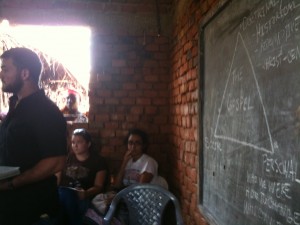A reflection from a yesterday in Akisan, Uganda:
 Today was positively exhausting. After an hours drive into the backwoods, I taught the History of Missions/Missiology course from 10-2, broke for lunch, and then taught an Pastoral Ministry class from 3-5. We discussed everything from stone worship to polygamy. The pastors were very engaged, took notes, and asked questions. Half of them didn’t have Bibles in their own language (Ateso) so Justin took a 3 hour roundtrip motorbike to the closest city to get 50 Bibles.
Today was positively exhausting. After an hours drive into the backwoods, I taught the History of Missions/Missiology course from 10-2, broke for lunch, and then taught an Pastoral Ministry class from 3-5. We discussed everything from stone worship to polygamy. The pastors were very engaged, took notes, and asked questions. Half of them didn’t have Bibles in their own language (Ateso) so Justin took a 3 hour roundtrip motorbike to the closest city to get 50 Bibles.
Receiving Bibles for the First Time
When it came to time to distribute the Bibles, people rushed the front jostling for a copy. We didn’t have enough for everyone, but those that received them were very grateful. One 80 year old man, Amos, had asked for a Bible the day before. When I gave it to him he was overjoyed. When we stopped at a trading post on the way out, and there he was on his bicycle, reading his Bible with another man.
War Orphans
 We got out at the trading post and went up to three cement rooms with bamboo mats, where 30 orphans sleep. They asked us to help feed them, provide clothing, and education. Many of the children have been displaced from an insurgency in the area a decade ago, losing their parents in the killings. Some lost their parents to AIDS or malaria.
We got out at the trading post and went up to three cement rooms with bamboo mats, where 30 orphans sleep. They asked us to help feed them, provide clothing, and education. Many of the children have been displaced from an insurgency in the area a decade ago, losing their parents in the killings. Some lost their parents to AIDS or malaria.
What would it look like for ACL to respond to these needs? How can you help? There are already three more tribes that want us to come and start more theological training centers. The women begged us to do a womens conference. Opportunities are ripe for mission. Search your heart and ask the Lord
Thank you for your partnership in the gospel, ACL!

 Myanmar
Myanmar